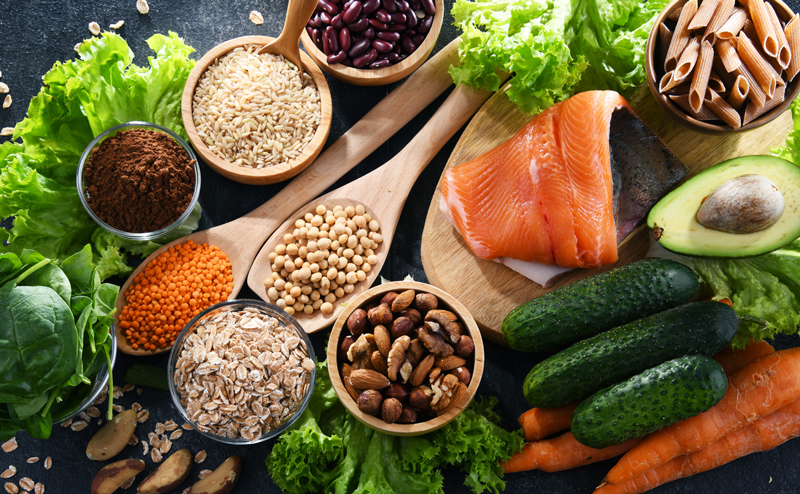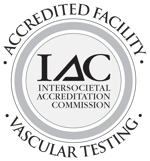A healthy vascular system is essential for good health. The vascular system carries nutrients, oxygen, hormones, and immune cells to every corner of your body. It also functions to collect and transport waste products to the lungs, kidneys, and liver for removal from the body. Any breakdown in this system and the health of your entire body can suffer.
There are many ways to improve the health of your vascular system, such as exercising and avoiding tobacco products, but since March is National Nutrition Month, let's focus on ways you can improve your vascular health through diet and proper nutrition.
A common theme underlying many of the chronic diseases that impair vascular health is inflammation. Acute inflammation is a good thing; it is part of your body's response to infections and trauma. Unfortunately, when inflammation becomes chronic, it can damage various parts of the body including the lining of the blood vessels. What you eat (and do not eat) can play a key role in reducing inflammation in your body.
Avoid Refined Carbohydrates
Eating highly refined carbohydrates, such as white bread, baked goods made from white flour, and the most refined carbohydrate of all, white sugar, promotes inflammation. It is ok to indulge in a sweet dessert or some crusty French bread on occasion, but sugar and white flour products should make up only a small part of a vascular-healthy diet.
Note that white, red, blue, purple, and yellow potatoes, especially if served with their peels on, are not highly refined carbohydrates and do not promote inflammation. Pasta made with semolina flour doesn't seem to promote inflammation the way white bread flour and cake flour do; thus, pasta could be part of a vascular-healthy diet.
Omega-3 Versus Omega-6 Fatty Acids
Polyunsaturated fats (PUFAs) are generally regarded as healthy fats. PUFAs come in two distinct types, usually referred to as n-3 and n-6 PUFAs or omega-3 and omega-6 fatty acids. The ratio of omega-3 fatty acids to omega-6 fatty acids affects the inflammatory state of the body. If too many omega-6 fatty acids are consumed relative to the amount of omega-3 fatty acids, this promotes inflammation. Although the healthiest ratio has not been definitively established, in general, the ratio should be between 4:1 and 1:1 omega-6 fatty acids to omega-3 fatty acids. Thus, trying to eat more omega-3 fatty acids and fewer omega-6 fatty acids will reduce inflammation and improve vascular health.
The major omega-3 fatty acids are DHA, EPA, and ALA. They are present at high levels in fish oil, krill oil, and nut and seed oils. The major omega-6 fatty acids are linoleic acid and arachidonic acid. They are found in many plant oils, such as soybean oil and corn oil.
Eat Your Veggies
Fruits and vegetables are loaded with anti-inflammatory compounds. Eating a wide variety of fresh, frozen, canned, or dried produce helps protect against inflammation. Leafy green vegetables, berries, cherries, kiwi fruits, grapes, tomatoes, and citrus fruits are particularly rich in beneficial compounds such as antioxidants which fight the inflammatory response. The general guidance is to eat at least five servings of vegetables and two servings of fruits every single day.
Many people claim they don't like vegetables, but it isn't hard to sneak vegetables into other foods, like tossing some leafy greens into a soup or omelet or adding pureed vegetables to a sauce. Snack on crunchy vegetables instead of reaching for a bag of chips.
Do avoid drinking fruit juice, though; the good parts of fruits tend to be in the solid bits.
In Summary
Reducing inflammation by making some minor dietary changes will help keep your vascular system in tip-top shape. To reduce inflammation,
DO EAT:
- Nuts and seeds
- Fruits and vegetables
- Fatty fish such as salmon
- Fish oil
- Nut and seed oils
EAT IN MODERATION:
- Plant oils rich in linoleic acid
EAT SPARINGLY:
- White flour products and refined white sugar
Contact us today to further discuss how nutrition can affect your vascular health!









.jpg?width=944&name=Castle-Connolly-Top-Doctors-Emblem-Large%20(4).jpg)